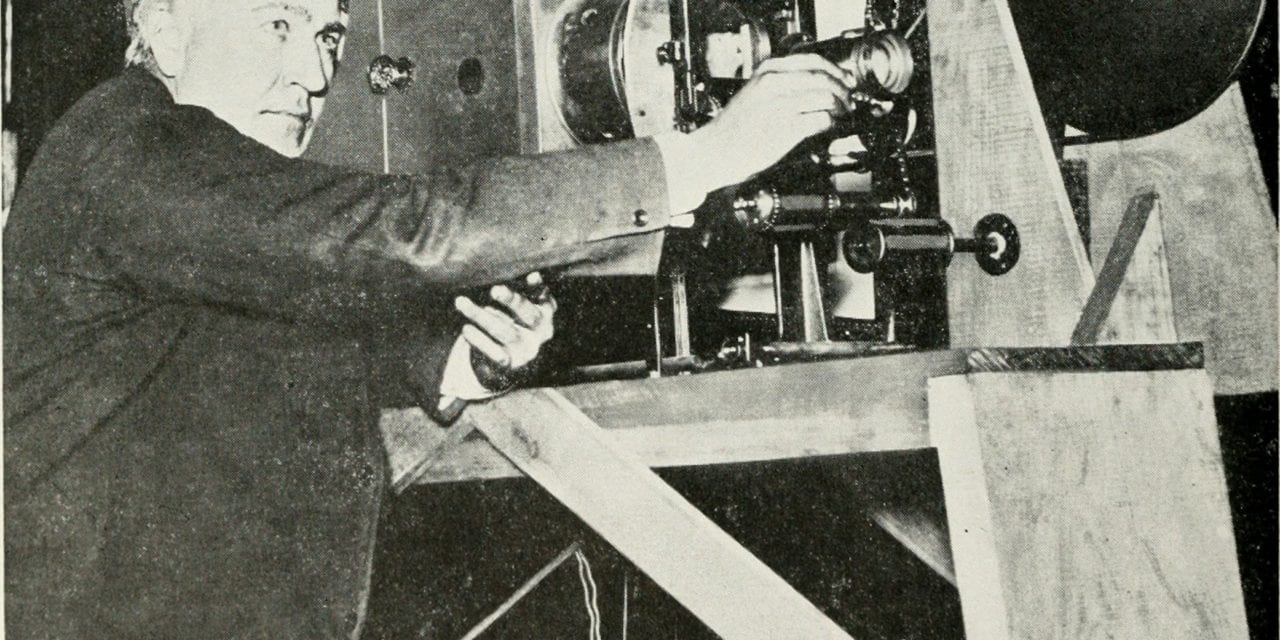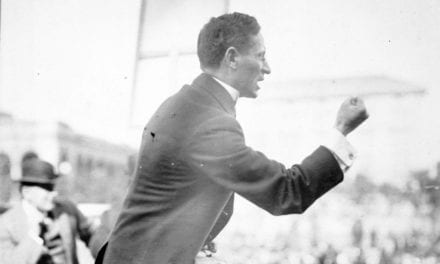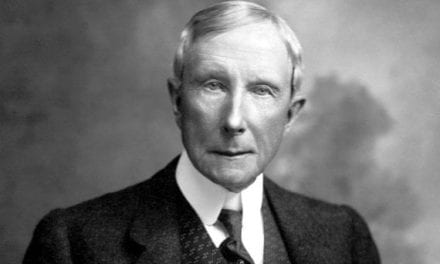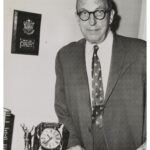Thomas A. Edison, the great inventor, answered this question in an interview with B.C. Forbes, founder of Forbes Magazine, in the January 1921 edition of “The American Magazine”.
“Every man has some forte, something he can do better than he can do anything else. Many men, however, never find the job they are best fitted for, and often this is because they do not think enough. Too many men drift lazily into any job, suited or unsuited for them; and when they don’t get along well they blame everybody and everything except themselves.
These grouches are nearly always pinheads, small men who have never made any effort to improve their mental capacity. The brain can be developed just the same as the muscles can be developed, if one will only take the pains to train the mind to think. Why do so many men never amount to anything? Because they don’t think!” said Mr. Edison with emphasis.
The great inventor leaned over and picked up a placard from a newly-opened package on his desk. “I’m going to have this put all over the plant,” he said, as he pointed to the large-type words. They read,
“That is true,” Edison said. “There is hardly a day that I do not discover how painfully true it is. What progress individuals could make, and what progress the world would make, if thinking were given proper consideration! It seems to me that not one man in a thousand appreciates what can be accomplished by training the mind to think. It is because they do not use their thinking powers that so many people have never developed a creditable mentality.
The brain that isn’t used rusts. The brain that is used responds. The brain is exactly like any other part of the body: it can be strengthened by proper exercise, by proper use. Put your arm in a sling and keep it there for a considerable length of time, and, when you take it out, you find that you can’t use it. In the same way, the brain that isn’t used suffers atrophy.
I said that there is something every man can do, if he can find out what that something is. Henry Ford has proved this. He has installed in his vast organization a system for taking hold of a man who fails in one department, and giving him a chance in some other department. When necessary, every effort is made to discover just what job the man is capable of filling.
The result has been that very few men have had to be discharged, for it has been found that there was some kind of work each man could do at least moderately well. This wonderful system adopted by my friend Ford has helped many a man to find himself. It has put many a fellow on his feet. It has taken round pegs out of square holes and found a round hole for them. I understand that last year only 120 workers of his force of 50,000 were discharged.
Let me cite an illustration from our own organization of how a man can be taught to think; and how, by doing enough hard thinking, he has accomplished something far beyond what would have seemed possible:
When I was a youth, I saved the life of a little boy by snatching him off a railway track just as a train was about to run over him. The boy’s father was a telegraph operator, and to show his gratitude he taught me telegraphy. Years after, things did not go well with him and he came to see me.
He told me that he was down and out, that apparently he was a lunkhead. I said to him, ‘Mack, I have an order from a company which wants to have a machine invented to a do a certain thing. See if you can’t work it out.’ He told me he never had invented anything, and he was quite sure he never could. I told him to go ahead and do his best, and that meanwhile I would give him enough salary to keep him and his family alive.
By and by he came to me with an idea. We tried it out; but it didn’t work. He was discouraged; but I insisted that he keep right at it and see if he couldn’t find what was the matter and then try and get around it. He did and finally conceived a workable machine. The company gladly paid five thousand dollars for it. This so encouraged him that he tried his hand at inventing other things, and became the inventor of quite a number of small things.
Now, how did this man manage to accomplish the things he did?
Simply because he used his thinking powers. He didn’t succeed at first; but because of my urging he kept at it until he developed his mind sufficiently to do the job. By developing your thinking powers you expand the capacity of your brain and attain new abilities.
For example, the average person’s brain does not observe a thousandth part of what the eye observes. The average brain simply fails to register the things which come before the eye. It is almost incredible how poor our powers of observation – genuine observation – are.
Let me give you an illustration:
When we first started the incandescent lighting system we had a lamp factory at the bottom of a hill, at Menlo Park. It was a very busy time for all. Seventy-five of us worked twenty hours every day and slept only four hours, and thrived on it. I fed them all, and I had a man play an organ all the time we were at work. One midnight, while at lunch, a matter came up which caused me to refer to a cherry tree besides the hill leading from the main works to the lamp factory.
Nobody seemed to know anything about the location of the cherry tree. This made me conduct a little investigation, and I found that although twenty-seven of these men had used this path every day for six months not one of them had ever noticed the tree.
The eye sees a great many things, but the average brain records very few of them. Indeed, nobody has the slightest conception of how little the brain ‘sees’ unless it has been highly trained.
I remember dropping in to see a man whose duty was to watch the working of a hundred machines on a table. I asked him if everything was all right. ‘Yes, everything is all right,’ he said. But I had already noticed that two of the machines had stopped. I drew his attention to them, and he was mortified. He confessed that, although his sole duty was to watch and see that every machine was working, he had not noticed that these two had stopped.
I don’t know whether the woeful failure of most people to think is due to faulty methods of teaching in our schools or not, but I am inclined to think it is. It seems to me that either the teachers are not practical, or else the authorities do not furnish the right kind of practical books. The more experience I have with young men, the more I am inclined to think that something is seriously wrong with both our common-school and our college systems of education. The children are taught a lot of theories which they seem to learn by rote.
At any rate, very few of them are taught to do any thinking of their own. I can very rarely find even a college graduate who can think to any purpose. I had a recent experience which proves how true, and tragic, this is.
I advertised for industrial chemists. The advertisement explained clearly what I wanted: Industrial chemists with experience in managing small chemical works making a diversity of chemicals. Thirty-six applicants came.
I had personally written out a questionnaire containing forty-eight questions. These questions were all exceedingly simple. If these applicants had the experience which the advertisement called for they could have answered every one of the questions readily.
But would you believe that out of the thirty-six at least thirty couldn’t answer even ten of the questions? Yet these young men had good recommendations, and many of them had worked for big concerns. The trouble was that they had never done any thinking. Eighty-five percent of them gave a formula for one thing which doesn’t exist! I got only one man out of the lot who was worth engaging.
It is the same way with many mechanical engineers. They are not mechanical engineers at all. They are utterly incompetent. Yet every large concern is employing these incompetents, causing loss to the companies – and therefore, the the public – of untold millions.
If companies would only put together a little questionnaire and have candidates for positions take this test, at least the worst of the incompetents could be prevented from being put into positions where their gross inability results in incalculable loss. How badly this country needs competent industrial chemists, engineers, electricians, and other men of scientific training! It needs these men more today than ever before, because the opportunities to raise America’s place among the industrial nations of the world are greater now than ever before. The world-wide dislocation caused by the war has opened innumerable new doors for Americans. We have a chance to do a lot of things which were formerly done by Germany.
Almost any salary would be gladly paid by chemical companies, electric companies, steel companies, automobile companies, rubber companies, and concerns like Eastman Kodak and the DuPonts for brainy, thoroughly-trained men capable of thinking up improved processes. And how easy it would really be for men to qualify for such places. It would take only a little study, only a little earnest, sustained, concentrated thinking. It wouldn’t be hard.
Many men holding executive positions have this same aversion from thinking. They have fifteen or twenty letters to write in a morning, and they will reply to all the easy ones, but balk at one requiring real thought and decision. They paw over it and put it off and off. They cannot bring themselves to do the amount of thinking necessary to give an intelligent decision.
Needless to say, these procrastinators are not the type who become really big executives. The man who is of the stuff that makes a big executive usually tackles the hardest things first. He does not necessarily decide an important matter right away. He either takes the papers home with him or carries the substance of the matter in his mind, thinks it all over from every angle, and then is in a position to dictate his decision the following morning. Such men may appear to decide things quickly; and in a sense, they do decide quickly; but the decision does not come until they have thought the thing out.
Thinking, after a while, becomes the most pleasurable thing in the world. Give me a satchel and a fishing rod, and I could hide myself off and keep busy at thinking forever. I don’t need anybody to amuse me. It is the same way with my friends, John Burroughs, the naturalist, and Henry Ford, who is a natural-born mechanic. We can derive the most satisfying kind of joy from thinking and thinking and thinking.
The man who doesn’t make up his mind to cultivate the habit of thinking misses the greatest pleasure in life. He not only misses the greatest pleasure, but he cannot make the most of himself. All progress, all success, springs from thinking.
Of course, even the most concentrated thinking cannot solve every new problem that the brain can conceive. It usually takes me from five to seven years to perfect a thing. Some things I have been working on or twenty-five years, and some of them ares till unsolved. My average would be about seven years. The incandescent light was the hardest one of all; it took many years not only of concentrated thought but also of world-wide research. The storage battery took eight years. It took even longer to perfect the phonograph.
Which do I consider my greatest invention? Well, my reply to that would be that I like the phonograph best. Doubtless this is because I love music. And it has brought me so much joy to bring music into millions of homes all over this country, and, indeed, all over the world.
Music is so helpful to the human mind that it is naturally a source of satisfaction to me that I have helped in some way to make the very finest music available to millions who could not afford to pay the price and take the time necessary to hear the greatest artists sing and play.
Many inventions are not suitable for the people at large because of their carelessness. Before a thing can be marketed to the masses, it must be made practically fool-proof. Its operation must be made extremely simple. That is one reason, I think, why the phonograph has been so universally adopted. Even a child can operate it…” Edison said with a smile.
“Another reason, is that people are far more willing to pay for being amused than for anything else. One great trouble with the world today is that people wander from place to place, and are never satisfied with anything. They are shiftless and thoughtless. They revolt at buckling down and doing hard work and hard thinking. They refuse to take the time and the trouble to lay solid foundations. They are too superficial, too flighty, too easily bored. They fail to adopt the right spirit toward their life work, and consequently fail to enjoy the satisfaction and the happiness which come from doing a job, no matter what it is, absolutely in the best way within their power.
Failing to find the joy which they found find in accomplishing something, the turn to every imaginable variety of amusement. Instead of learning to drink in joy through their minds, they try to find it, without effort, through their eyes and their ears, and sometimes their stomachs.
It is all because they won’t think, won’t think!” reiterated Mr Edison, bringing his fist down vigorously upon his desk.



























